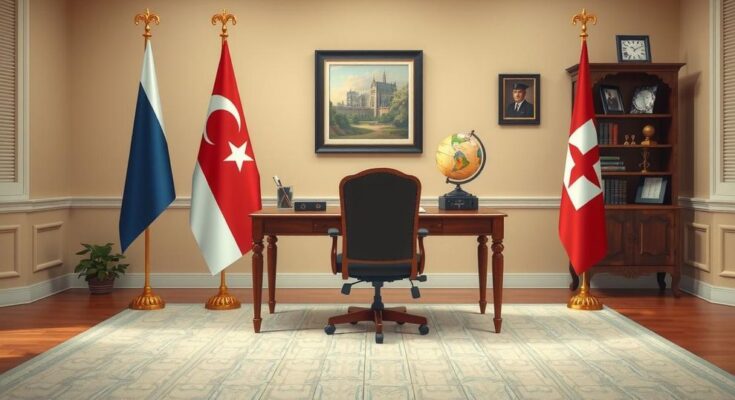South Sudan’s President Salva Kiir has dismissed ambassador Monica Achol Abel amid rising political instability. This follows increased tensions between Kiir and first vice president Riek Machar, with armed forces surrounding Machar’s residence. Political crackdowns continue as key officials are detained, raising uncertainty over South Sudan’s fragile peace process, despite regional efforts for stabilization led by Kenyan President William Ruto.
South Sudan’s political climate has taken a tumultuous turn with President Salva Kiir’s dismissal of the ambassador to Kenya, Monica Achol Abel, merely four months after her appointment. This decision, announced through state television and reported by government sources, occurred without any formal justification, reflecting President Kiir’s history of sudden personnel changes, particularly on Mondays and Wednesdays.
As political tensions reach critical levels in Juba, the relationship between President Kiir and his first vice president, Riek Machar, has significantly soured, with armed forces now surrounding Machar’s residence, raising concerns about the stability of the coalition government. Abel’s removal is indicative of a wider crackdown on dissenting political figures as South Sudan’s National Security Service escalates the apprehension of prominent officials.
Moreover, the internal strife within the governing administration is evident as NSS operatives detained Minister of Peacebuilding, Stephen Par Kuol, following the arrest of Petroleum Minister Puot Kang Chuol. These events highlight an internal power struggle that threatens to destabilize the already fragile peace process in South Sudan, which has struggled to make significant progress, despite various peace agreements.
Kenyan President William Ruto, overseeing the Tumaini Initiative peace process, has recognized the escalating crisis. He has engaged in discussions with both Kiir and Machar, urging them to pursue dialogue to foster peace in South Sudan. Ruto also mentioned that regional consultations are ongoing to explore effective resolutions to the precarious situation in the nation.
Since its inception in December 2013, South Sudan’s civil war has stemmed from political disparity within the ruling Sudan People’s Liberation Army. Amidst a backdrop of escalating violence and ethnic tensions, numerous peace agreements, including the 2018 Revitalised Agreement, have failed to establish lasting peace. As Kiir’s political maneuvers tighten control, the prospects for sustained stability in South Sudan remain highly uncertain.
In summary, President Salva Kiir’s dismissal of ambassador Monica Achol Abel reflects a broader trend of political instability and internal power struggles within South Sudan. The relations between Kiir and Riek Machar have worsened, leading to increased tensions. With ongoing arrests of key officials and the fragile peace process still vulnerable, the future of South Sudan remains precarious. Efforts for dialogue and regional support are essential to navigate this turbulent political environment.
Original Source: eastleighvoice.co.ke




